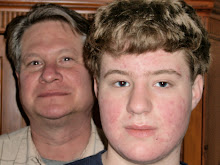Released: 1958
Genre: Flyboy adventure
Notable for: A legendary director's last film
Clint's subliminal message: "Thanks for giving my character a name."

Andy celebrated a milestone the day we watched "Lafayette Escadrille" by becoming a man. He was a little distracted.
Normal American society, at least here in bucolic southern Michigan, has no ambiguity about when a boy becomes a man. It has nothing to do with sex or self-awareness or maturity.
Boys become men when they are handed a license to drive. Obtaining the legal power to drive to any destination means obtaining the freedom of mobility that we Americans often confuse for a life of unlimited possibilities.
Andy turned 16 on March 18, 2010. He was in no eager mood to celebrate by watching Clint Eastwood in another ultra-minor role from the 1950s.
"I want to go out driving. By myself," he said.
Andy returned about 45 minutes later with a glow about him.
"How was your drive?" Brad asked.
"Like sex on cocaine."
It seemed obvious that a father should not allow a teenage son to fake expertise on the subjects of sex or drugs. But the phrase did capture a sense of euphoria.
"Don't ever say that again," Brad said by way of fatherly guidance, "in front of your mother."
No one would ever compare watching "Lafayette Escadrille" to stimulation of either a sexual or pharmacological nature.
We held high hopes for this film because it is a war movie made by a legendary director, William "Wild Bill" Wellman. Excitement, or at least action sequences, seemed likely.
Those foolish hopes were dashed.
The Lafayette Escadrille was a squadron of American combat fliers who served for France in World War I. Wellman was a member in real life. The squadron had a very high fatality rate, and early in the movie a narrator introduced viewers to characters by telling which ones would later die.
But instead of being a war movie, this is the story of a surly and selfish young man -- played without inspiration by Tab Hunter -- who falls in love with a French girl and finds himself.
Who cares? Hunter's character is unlikeable and his boring odyssey of self-discovery last almost the entire movie. There is no air combat until the last five minutes of the movie. And then the sequence was so muddled we were not sure if any Americans died.
"They made such a big deal at the start of the movie about all those guys dying in combat," Andy said. "And then ... nothing."
Clint received a credit for a change and his character even had a name, George Moseley. But he was still barely more than a walk-on. Moseley was a football star from Yale who had a rivalry with another flier who went to Princeton. His big scene was in a baseball game when Clint, the batter, took off after the Princeton guy, the pitcher, and threw the bat at him. That's pretty much all Clint brought to the table here. Play the video below if you must see this movie magic.
It seems inexplicable that Wellman could make a movie so bad. Evidently it was inexplicable to him, too. According to Wellman's bio on IMDb, he quit making movies after "Lafayette Escadrille" and was "reportedly enraged at Warner Bros.'s post-production tampering with a film that meant so much to him."
This, in short, is not even close to sex on cocaine.
Next up: "Ambush at Cimarron Pass."


The fellow pitching is Tom Laughlin. so you have Billy Jack beaning Dirty Harry...only in the movies. :)
ReplyDeletePlease Note: There was no Wellman in the Lafayette Escadrille. Most of the 38 Americans in the LE are listed here:
ReplyDeletehttp://www.usaww1.com/Lafayette_Escadrille.php4